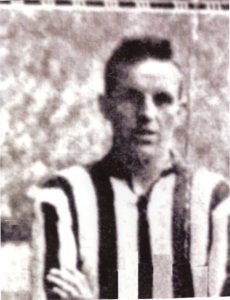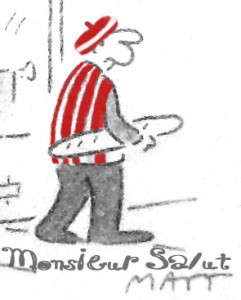
Only last June, Salut! Sunderland recorded the sad loss of Bill Richardson, a long-time Wearside exile who remained a passionate supporter of the club he left behind in a country he never revisited. He retired only in 2015 but died last summer apparently after suffering a stroke … the little piece that appeared at the time of his death is reproduced below, for its own sake and also in the hope of jogging someone’s memory.
We have just received the following message from Lilian Martin, Bill’s friend and colleague and – as you will see by scrolling down – a woman with her own historical connection to Sunderland:
“Here’s hoping you can possibly help with the following which I received via Facebook from a chap who used to work with Bill Richardson. Sadly, Tina (Bill’s wife) has also passed away. Bill’s daughter is the sole beneficiary in his will now and no one knows where she is. It is possible that she may be living in Sunderland again.”
This is the message:
We are urgently looking for Victoria Maria Richardson (maiden name?), daughter of William Graham Richardson, originally from the Sunderland area of the UK.
Could anyone who knows her or knows of her whereabouts please ask her to contact me via email at this address or by phone at +27823364357
AND HERE, by way of introducing or re-introducing Bill (and Lilian) properly, is what we published eight months ago:
In our Mackem Diaspora series, Bill described himself in this way:
Born in Seaham ’47. Left for Natal, South Africa ’78. Moved up to the Transvaal in ’81 (Mpumalanga now) on the day Reagan was shot. Spent time in Swaziland, Cape Town (nuclear power station) so know what the problem is at Fukushima. Back in the old Transvaal now. Coal fired station. Never been back to Blighty …
Yet Sunderland AFC were never far from Bill’s thoughts. He was a regular, lively and valued contributor to the Black Cats e-mail forum, as comments reacting to news of his death demonstrate:
Very sad, always enjoyed his contributions – he had a real quirky sense of humour. RIP Bill – Paul Roberts
The list will be a less colourful place without him – Mike Allcock
RIP Bill. And by way of recognising the part of his life that was SAFC, here is a piece he inspired (go to the link – https://safc.blog/2011/08/isaac-mcgorian-of-sunderland-notts-county-and-carlisle-a-tribute-revisited/ – for some lovely comments) …

The story of Isaac Moore (“Ike”) McGorian, who played for Sunderland AFC in the 1920s, first appeared here earlier this month under the headline Isaac ‘Jack’ McGorian: echoes of Bardsley from the Roaring Twenties
Salut! Sunderland’s article drew a heartwarming response from members of his family, who also provided the photographs and much of the detail that enabled me to prepare it. Bill Richardson, a Sunderland supporter long exiled in Africa, was the spur: his comment on an e-mail forum had set the ball rolling.
But Bill also has something to answer for: what bemused his colleague, Lilian Martin, the player’s younger daughter, about my report was the use of Jack as her father’s nickname. He had never been known as such, she said. A daughter, you may well say, ought to know.
Indeed, the reference book mentioned in my report confirms this, giving the name as Isaac Moore (“Ike”) McGorian. his later career included stints at Notts County – whose supporters might find this item on Les Bradd of interest, too – and Carlisle United (their fans will most certainly wish to avoid this story).
So this is an attempt both to set the record straight and bring to wider attention the responses received to the original posting, which now follows …
Not for nothing do we boast of going to the ends of the earth to find interesting snippets about Sunderland AFC. The story, for Salut! Sunderland‘s purposes, began in a coal-fired power station in the Transvaal.
Bill Richardson, a Seaham lad who has not seen his home town or even country for a long, long time, works there. And this is what he wrote a month or two ago at the Blackcats list, an e-mail loop that brings together SAFC fans wherever they find themselves in the world:
I only found out at the weekend that one of the ladies I work with, father played for Sunderland 1926. His name was Jack McGorian.
Without the aid of a phone-hacking manual or bribes for coppers, Salut! Sunderland sleuths set to work.
First port of call was my bible, Rob Mason’s indispensable Sunderland: The Complete Record (statistics compiled by Mike Gibson and Barry Jackson). There, we learn that – shades of Phil Bardsley – McGorian was a right or left back who played 22 times for the club between 1924 and 1929 and even scored once, joining Bobby Gurney on the scoresheet in a 3-1 win against Notts County in the last game of the 1925-26 season.
If the record seems modest, it should be borne in mind that Sunderland were quite a force in those days.
The daughter mentioned by Bill is Lilian Martin, who – with the help of her sister, Delia – has kindly supplied details of Ike McGorian’s life and times.
Isaac Moore McGorian, to give him his full name, was born on Oct 19 1901. He was a Sunderland lad, breathing his first in South Bishopwearmouth, in what I am pleased to remind everyone was in County Durham, to Joseph, a coalminer, and Mary Jane McGorian (nee Ashbridge). Lilian calls her father Isaac throughout, never Jack.
He was raised in Sunderland, one of a family of 10 children – six boys and four girls – and left school at the age of 14 to follow his dad down the pit. In fact the family grew to 11 when his parents adopted a neighbour’s orphaned son.
Escape from the mines came at 22, when Isaac became a professional footballer, signing for his home-town club. Here, the family records begin to differ a little from the Rob Mason book, Lilian stating that her father played at right-half for them for five seasons (1922-1927). I will stick for now with her account:
“Sunderland’s First Division record for those five seasons makes interesting reading:
1922-23: Runners-up to Liverpool (6 points behind)
1923-24: Third (53 points) behind Huddersfield (champions, 57) and Cardiff (57)
1924-25: Seventh (48)
1925-26: Third (48) behind Huddersfield (Champs, 57) and Arsenal (52)
1926-27: Third (49) behind Newcastle (Champs, 56) and Huddersfield (51)”
Rob Mason and his statisticians have McGorian’s SAFC career tailing off in 1927-28, when we slipped to 15th (recovering to fourth in the following season, by which time he had left the club).
In the 1925-26 season, Lilian relates, he played against Stan Seymour (England and Newcastle), “one of the most outstanding left wingers of that time who played a major part in Newcastle winning the FA Cup in 1924 when he scored a goal in his club’s 2-0 victory against Aston Villa in the final”.
Having emigrated at the end of his professional playing career, he was reacquainted with Seymour in 1952 in Salisbury, Southern Rhodesia, when Newcastle toured Southern Africa as the FA Cup holders with Seymour by then the Newcastle team manager.
Isaac also played in the same Sunderland team as Charlie Buchan, described by Lilian as “the famous inside-right, a prolific goalscorer who scored a club record of 209 goals for the club between 1911 and 1925 when he was transferred to Arsenal”.
She adds that Isaac also represented the North of England XI against a Football Association XI in 1926, playing at right-half. He was transferred from Sunderland to Notts County in 1927 and played for them for four seasons (1927-31) and also played for Carlisle United.
This, from the Notts County transfer, is priceless:
In terms of an “Agreement for hire of a Player” between Isaac McGorian and Horace Henshall representing Notts County FC dated 30th April 1929. It was agreed that “the Club shall pay the said Player the sum of Six Pounds per week from May 6 1929 to August 24 1929 and Seven Pounds per week from August 24 1929 to May 3 1930 at which date the Agreement shall cease and determine. The Club shall pay the Player One Pound per week extra when in the First Team.”
And so, from the contract’s terms, is this:
“If the player shall prove palpably inefficient or shall be guilty of serious misconduct or beach of the disciplinary Rules of the Club, the Club may on giving 14 days;’ notice to the said Player or the Club may on giving 28 days’ notice to the said Player on any reasonable grounds terminante this Agreement and dispense with the services of the Player (without prejudice to the Club’s right for transfer fees) …”
What would Newcastle’s collection of former prisoners, care-in-the-community cases and Bigg Market bruisers make of that?
Lilian, above such tribal banter, resumes the story: “My father emigrated to South Africa in 1937 and settled in Kimberley where he was employed as a miner by De Beers Diamond Mines. He continued to play football for the local club De Beers and captained Griqualand West against the touring England FA team in 1939 in the last game of of their tour which England won 10-1!
“Isaac McGorian met his wife-to-be Mary Emma Engelsman while in Kimberley and was married to her on August 31 1940 in St Mary’s Cathedral in Kimberley and left Kimberley on the same day by train to live and work at the Roan and Antelope copper mine in Luanshya, Northern Rhodesia as a timberman.”
She says he was also a talented billiards and snooker player and once played an exhibition match against the world champion Horace Lendrum in Modderfontein, South Africa. He was also an excellent bowls player and won many tournaments and championships after he retired from football.
While in Luanshya the McGorians had their first child, Delia Mary, born in August 1943. The family moved back to Kimberley for a short time and then returned to Northern Rhodesia, this time to live in Chingola where Isaac worked at the Nchanga Copper Mine where Lilian Marguerite was born in October 1948.
The family decided to relocate to Salisbury Southern Rhodesia in 1951 and McGorian retired from mining and became the manager of the Cranborne Arms Club. Isaac eventually became a security officer based at the Salisbury International Airport.
Lilian adds the sad note that her father died in hospital on October 14 1978, a week after being involved in an accident and five days short of his 77th birthday. His nephew, Joseph McGorian, “was also heavily involved in football in England and was the president and a major force in the early years of the development of Southern League club, Solihull Borough … The club was elected to the Southern League Midland Division in 1991-92 and won the championship at its first attempt.”
* In the Salut! Sunderland “Mackem Diaspora” series,:Bill Richardson wrote: Born in Seaham ’47. Left for Natal, South Africa ’78. Moved up to the Transvaal in ’81 (Mpumalanga now) on the day Reagan was shot. Spent time in Swaziland, Cape Town (nuclear power station) so know what the problem is at Fukushima. Back in the old Transvaal now. Coal fired station. Never been back to Blighty …

It may well have been the Patsy but he never scored in the 37 Cup Final. The scorers were Bobby Gurney, Raich Carter and Eddie Burbanks.
My copy of “All the Lads” says that the “Mighty Atom” did score in the semi final however and went into business in London after his playing career ended so it is conceivable that he lived and/or drank in Epsom.
It also says that he spent his last few years back in Scotland which might explain his sudden disappearance from those Surrey watering holes.
Thanks for the feedback Malcolm.
I love these stories about long gone Sunderland players and fans.
My own is as follows : I was demobbed from the army in May of 1958. A month or so later, a friend who knew I was a Sunderland fan, told me that one of our ex players was living in Epsom [ where I lived at that time ] and frequented one of the high street pubs.
I made a point of going with him, and he introduced me to a rather frail man with a Scottish accent who told me he was Patsy Gallagher who played in the 1937 final against PNE and scored one of the goals.
He seemed a bit down on his luck, and I was a little sceptical. However I asked him a lot of questions, and he spoke with knowledge about that Sunderland side, and the final itself.
I asked my Dad’s opinion. Dad was from Hendon [ the Sunderland version ] and knew more about the 1937 team than I did. [ Dad lived near Raich Carter as a young man ]
My Dad had also met this man. My Dad wasn’t convinced, but like me he had no reason to disbelieve him. I talked to him a few times, and bought him a few drinks on the basis of his story. However he suddenly disappeared, and I never saw or heard of him again.
I have often wondered if it was the great man, and I wish I had asked for his autograph.